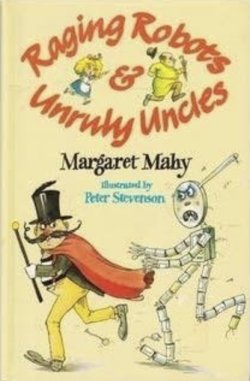Gareth B. Matthews

Review of Raging Robots and Unruly Uncles by Margaret Mahy (London: J.M. Dent, 1981). Originally published in Thinking: The Journal of Philosophy for Children 4(2): 3.
Wicked Jasper, a villain by profession, has seven sons he has named after great villains of history-Caligula, Nero, Genghis, Tarquin, Belshazzar, Adolph and little Jack. Wanting his sons to follow in his own wicked footsteps, he sends them to a select school for villains. Jasper’s twin brother, Julian, is, by contrast, a paragon of virtue. He sends his only child, Prudence, to the Select Academy for Old-fashioned Heroines. As a practical joke, Jasper’s sons mail Prudence a goody-goody robot, Lilly Rose Blossom, to taunt her.
In response, Prudence sends Jasper’s boys a fiendishly insolent robot called ”the Nadger. ” The immediate result of this exchange is that Jasper’s seven sons and Julian’s daughter all run away from home and team up together. The Nadger then hounds Jasper with a level of bad behavior his own sons never attained to, and Lilly Rose Blossom suffocates Julian with ceaseless efforts to improve him.
In the end, Lilly’s virtue is turned on the Nadger’s viciousness. With the robots thus neutralized, a wiser Jasper and a chastened Julian rejoin their children, who have already formed a successful community together.
Though zany and wildly farcical, this story is also serious and thought-provoking. There is insight in the Nadger’s claim that he and Lilly are Jasper’s and Julian’s true children, being “the children of their ideas.” ”You,” he says to Prudence and the boys,
“are nothing but blood and bones, but we are their thoughts. You grow tired but we go on and on forever unchanging.” (83)
When, a little later, the Nadger is threatened by Prudence with extinction, Lilly protests eloquently: “It is true… that the Nadger has stolen a wide variety of goods from supermarkets-but is it not because that is what he was MADE to do? It is true he is a collection of tins wired together, but by now he has a name and he know himself. Is it fair to destroy him for being what he was invented to be?” (85)
Here, in ethical as well as epistemological and metaphysical terms, is the problem of minds and machines. If the Nadger simply does what he was programmed to do, then surely, he is not a person and has no mind. If, however, he knows himself to be the Nadger, then surely, he is a person and has a mind. And if he is a person and has a mind, then surely it is wrong to destroy him for doing what he was programmed to do.
But does he know himself to be the Nadger? What would show that he does? or that he doesn’t? or couldn’t? And how, come to think of it, do we know that we weren’t programmed to do what we do programmed, not by mischievous electronics wizards, but by our genes and our environment?
Is free will the key? “You can stop playing the game of villains and heroes when you want to,” Lilly says later on; but “the Nadger and I are bound, by wrong measurements and by wickedness circuits, to be heroine and villain forever.” (85) Are we really any more free than these robots? Or are we, too, bound by our ”measurements” and “circuits”?
In fact, Prudence, “with the skill of inspiration,” changes the Nadger’s circuits so that, listening to Lilly, he will improve ”to the point of being merely BAD.” (88) Do we have any better hope?
Could one conceivably want one’s children to be consistently villainous? For that matter, could one want them to be consistently virtuous? As readers we are relieved to learn that virtuous Julian no more succeeds in his educational goals than wicked Jasper does. Is that because we, too, are mixtures of virtue and vice? Or is it because we have a wrong conception of virtue? Is there something inherently unsatisfactory about extremes, even extreme virtue? Or is it wrong to suppose that virtue could be an extreme? Is virtue, as Aristotle suggested, always and everywhere a mean?
None of these questions is answered by Margaret Mahy’s wittily wise story. But it would be hard to think about her story very long without taking a stab at answering some of them for oneself.
